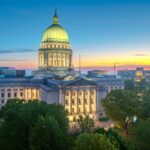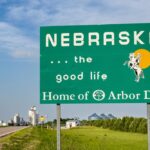Wisconsin online betting bill hits legislative roadblock

The Wisconsin State Assembly has abruptly pulled a planned vote on a bipartisan bill that would have legalized online sports betting through tribal operations.
Assembly bill (AB) 601, co-authored by Rep. Tyler August, Rep. Kalan Haywood, and Sens. Howard Marklein and Kristin Dassler-Alfheim, also received the support of Gov. Tony Evers, who had already indicated his support for action that would keep gambling with the tribes in an interview with Upfront.
Support for the proposal also came from the Milwaukee Brewers, Ho-Chunk Nation, Metropolitan Milwaukee Association of Commerce, and the Forest County Potawatomi Community.
However, AB 601 has now stalled as mounting opposition has grown from republican groups.
The Green Bay Packers also weighed in on the issue with a statement on Wednesday. “While the Packers don’t oppose the bill, it was inaccurately reported that we supported the bill, which would be a step toward expanding legalized sports betting in Wisconsin,” it said.
Speaking on why the bill was pulled so abruptly, Assembly Majority Leader Tyler August said, “I’m not going to get into the details of the conversations I’ve had with members, we’re just working through some of that right now, and I’m confident, there’s no rush on this, it’s the right thing for the state, and I’m confident we’ll get there.”
August said he expects the vote will now likely take place next year when the assembly reconvenes. Prior to this, the representative also cautioned against the launch of prediction markets in the state if the bill is not passed.
Charlotte Capewell brings her passion for storytelling and expertise in writing, researching, and the gambling industry to every article she writes. Her specialties include the US gambling industry, regulator legislation, igaming, and more.
Verticals:
Sectors:
Topics:
Dig Deeper
The Backstory
Why the vote was pulled and what’s at stake
Wisconsin’s push to legalize statewide online sports betting through tribal operators hit a pause when Assembly leaders yanked a planned floor vote. The delay caps a sprint that began in late fall, when a bipartisan group of lawmakers introduced Assembly Bill 601 to expand wagering beyond on-site tribal sportsbooks while keeping gambling authority with the state’s federally recognized tribes. The measure drew support from Gov. Tony Evers and several business groups, but internal Republican resistance and mixed signals from influential stakeholders, including the Green Bay Packers, complicated the count. Backers say the bill would move wagering into a regulated channel and stem leakage to offshore sites and neighboring states. Opponents warn that legal mobile betting would elevate problem gambling risks and expand accessibility statewide.
The roadblock arrives after weeks of momentum. The bill cleared a key Senate committee and was teed up for Assembly action before leadership stepped back to regroup. The sponsor team insists there is no rush and argues the extra time will help consolidate votes and assuage skeptics. The timing matters: every session without a statewide framework keeps sports betting confined to on-site tribal venues and leaves consumers to unregulated markets. It also prolongs uncertainty for tribes that have positioned themselves as the state’s gateway to mobile wagering under a compact-based model.
How the proposal took shape
Lawmakers framed the plan as a narrow expansion tethered to tribal sovereignty and existing constitutional constraints. Under the proposal, Wisconsin residents could place online bets from anywhere in the state, but all wagers would be routed through servers located on tribal land. The structure mirrors Florida’s “hub-and-spoke” system, which allows mobile access while asserting that the bet is legally placed on tribal territory. When the idea surfaced publicly, sponsors said it would modernize Wisconsin’s wagering market, align the state with peers and create guardrails absent in the gray market. Early coverage outlined the intent: authorize tribal operators to launch mobile platforms while excluding out-of-state brands not licensed in Wisconsin, a design supporters argued would keep economic benefits local and respect compacts with tribes. That approach was detailed when lawmakers introduced a bipartisan bill to allow residents to place sports bets online.
The bill’s contours hardened as it advanced. A Senate panel endorsed the legislation, moving it to the floor on a party-line vote, as reported when the proposal made fast progress through the legislature. Supporters emphasized consumer protection, revenue capture and tribal oversight. Opponents countered that letting people bet anywhere would normalize and expand gambling risks. The committee action suggested enough bipartisan interest to keep the bill viable, even as social-impact arguments gained traction outside the Capitol.
The Florida-tested model and Wisconsin’s twist
Wisconsin’s plan leaned on legal precedent from Florida. There, a similar hub-and-spoke arrangement with the Seminole Tribe survived a federal court challenge, bolstering confidence that a compact-based mobile framework could endure litigation. In Wisconsin, proponents said the bill clarified jurisdiction by tying servers to tribal land and avoiding a direct conflict with constitutional limits on gambling geography. That feature was central when lawmakers proposed a statewide online sports betting system routed through tribal servers. Backers cited the D.C. Court of Appeals decision that upheld Florida’s deal as a roadmap for Wisconsin.
The twist is political as much as legal. Wisconsin’s bill excludes national sportsbook brands not operating under tribal authority, a boundary meant to preserve compact integrity and tribal primacy. That restriction also narrows the coalition by sidelining major commercial operators, even as some professional teams and business groups voiced support for a regulated mobile market. It left tribes—already running on-site books—at the center of any online expansion, an arrangement consistent with the state’s constitutional and compact framework.
Prediction markets, lawsuits and the gray zone
As legislators debated the bill, another risk emerged: prediction markets and event-contract platforms that function outside traditional gambling licensure. Assembly leaders warned that, without a statute, those platforms could fill the gap. In the run-up to the now-delayed vote, Rep. Tyler August argued that unregulated markets would proliferate if lawmakers stalled, urging colleagues to channel activity into a compact-based system. That warning was covered when a Wisconsin lawmaker said prediction markets would launch even if sports betting is not approved.
The legal pressure is not hypothetical. The Ho-Chunk Nation and others have prepared lawsuits against companies they contend are operating illegal gambling under the guise of financial products, citing platforms such as Kalshi. Kalshi maintains it is a federally regulated marketplace, not a sportsbook. The disputes underscore the compliance vacuum around event contracts and the difficulty of policing them without an explicit state regime. For tribes and regulators, a compact-aligned statute would create clearer jurisdiction, establish consumer protections and put state-backed rules over a market that is already active in various forms.
Public health concerns and the politics of access
The most persistent line of resistance centers on online access. Public health advocates and some lawmakers argue that mobile betting increases the risk of addiction, citing studies showing higher rates of overspending and compulsive behavior online compared with in-person gambling. When supporters first outlined the bill’s expansion beyond tribal casino floors, opponents highlighted research that a notable share of online gamblers find digital betting more difficult to control. Sponsors acknowledge the concern but say the status quo offers fewer tools to intervene. They argue a legal system can fund treatment, enforce age checks and set limits that illegal operators ignore.
This fight has also pulled in sports franchises. The Packers clarified they did not endorse the bill after an earlier report suggested otherwise, reflecting the sensitivity of team support in a state where loyalty runs deep and legislative margins can be thin. The clarification deprived backers of an influential talking point and signaled that, even among stakeholders open to regulated betting, public posture matters as much as policy detail.
Regional momentum and the next session
Pressure is building from neighboring and nearby states. Nebraska advanced an online sports betting proposal from committee, moving toward a model that would park operators at licensed racetracks and direct revenues to property tax relief. Lawmakers there cited cross-border betting and the inevitability of mobile access as reasons to act, as outlined when Nebraska’s bill advanced from a legislative committee. Wisconsin faces a similar reality: residents can access betting across state lines or through unregulated apps, and tax and consumer protections flow with them.
For Wisconsin, the path forward runs through caucus math and compact mechanics. The bill’s authors plan to revive the vote next session, counting on time to reconcile concerns about accessibility and to shore up support among Republicans wary of rapid expansion. If they succeed, Wisconsin would join states that have blended mobile convenience with tribal control. If they fail, the gray market and neighboring options will continue to siphon wagers, leaving tribes without a statewide online foothold and policymakers with less leverage over a market already in motion.






